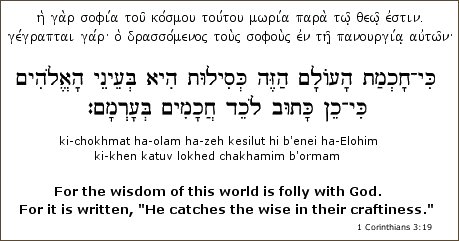|
|
|||||||||||||||||||||
 |
|||||||||||||||||||||
|
Learn Hebrew |
|||||||||||||||||||||
|
|
||||||||||||||||||||||||||||
|
The "wisdom of this world" (Žā╬┐Žå╬╣╬▒ Žä╬┐Žģ ╬║╬┐Žā╬╝╬┐Žģ Žä╬┐ŽģŽä╬┐Žģ) is the prevailing cultural spirit that suppresses the reality of God's Presence and truth. It is the realm of the savvy, the worldly-wise, the shrewd, the intellectual, the prudent, and even the "doctrinally pure," as we will see. Yeshua once remarked that "the sons of this world are more shrewd (ŽåŽü╬┐╬Į╬╣╬╝ŽēŽé) in dealing with their own generation than the sons of light" (Luke 16:8) |
 |
|||||||||||||||||||
|
In the verse above (1 Cor. 3:19), the Hebrew word translated "folly"is kesilut (ūøų╝ų░ūĪų┤ūÖū£ūĢų╝ū¬), perhaps better understood as stupidity (the Greek word used is ╬╝ŽēŽü╬╣╬▒). The "wisdom of this world" is ultimately based on fear that leads to the desire to control others. Sometimes, as in the case of warfare, it leads to acts of violence and murder. Human reason designs and schemes in order to obtain its self-serving ends, whereas heavenly wisdom understands that there is no further "end" in sight than that of the LORD Himself and His Presence....
Our battle today, as it always has been, is to combat the world and its "wisdom" (i.e., propaganda, lies, and disinformation) that implicitly (and sometimes explicitly) denies God's Presence (1 Tim. 6:12; Eph. 6:10-18). This is essentially a spiritual war, since the battlefield is the thickened hearts and dulled minds of those who are in varying states of blindness to the truth (2 Cor. 4:4; 10:4-5). Of course we must begin with ourselves and examine our own inward condition (2 Cor. 13:5). Are we genuinely walking in faith? Do we experience every moment of our lives as a gift from God? Do we directly encounter the Teacher within our hearts, or are we merely impostors, pretenders, or professors? |
|||||||||||||||||||
|
ki motzi matza chayim, va-yafek ratzon me-Adonai |
|||||||||||||||||||
|
For whoever finds me finds life and obtains favor from the LORD |
|||||||||||||||||||
|
Hebrew for Christians |
|||||||||||||||||||
|
|||||||||||||||||||

